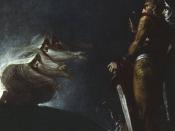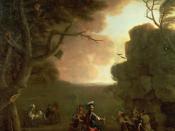Macbeth, a brave, noble and mighty warrior, and Banquo, his friend and fellow commander of the Scottish army, are returning from battle when they encounter three weird sisters upon the moors. These witches each make a personal prophecy for both Macbeth and Banquo's future, triggering hidden ambition and pride. Macbeth's prophecies lead to regicide, murder and a downward spiral into depression for both him and his wife.
Macbeth was the one who physically carried out the murder. This is undeniable evidence that Macbeth is either completely or partially responsible for his actions. The witches and Lady Macbeth are the other possible accomplices to be examined in this essay.
The three weird sisters, or witches, gave Macbeth three titles whilst on the moor. The first was his present title, "Thane of Glamis,"ÃÂ the second, "Thane of Cawdor,"ÃÂ was given to him shortly after this encounter. However, it is the third and final title that is the most controversial and raises a personal dilemma for Macbeth: "All hail, Macbeth! That shalt be King hereafter."ÃÂ
(I,3,50) This startles Macbeth to the point where it is physically noticeable by Banquo. Thus indicating that perhaps Macbeth jumped upon hearing these words. This could suggest a guilty conscience; it's possible that Macbeth had already thought about being king, which would explain his surprise at hearing such a prophecy. If this is indeed the case then the witches are not to blame for the death of Duncan. It is possible that the witches simply picked up on Macbeth's ambition. If he had sincerely never contemplated becoming king then the witches are responsible for giving him thoughts of regicide. However, one does not simply commit murder because they are told they are going to become king. The ambition and drive must be real, stored deep inside, hidden from others but still remembered.
As a warrior Macbeth is cold-hearted in his killing, slaughtering countless in battle without hesitation. Being unafraid of what he did and the things he saw in war a streak of violence can be detected in Macbeth. This shows he is able to kill without remorse for his cause. "Brave Macbeth"ÃÂ has earned titles and respect from his king for his great military accomplishments: "No more that Thane of Cawdor can deceive Our bosom interest. Go pronounce his present death, And with his former title greet Macbeth."ÃÂ (I,3,65-67) This signifies the first prophecy coming true. At first this startles Macbeth and he feels uncomfortable in "borrow'd robes."ÃÂ It triggers his ambition and he soon feels more comfortable in someone else's title. He is concerned that the greatest of the three prophecies, the last, has not occurred yet and the first thoughts of murder enter his mind. Seeing his future before him, knowing he must murder to fulfil his ambitions, disturb him and his entire being.
It is possible Macbeth may have been his own inspiration for this unholy murder as he has revealed to the audience his thoughts of regicide. It could be argued it was initially his idea and plan to force the coming of the third and final prophecy: " My thought, whose murder yet is but fantastical, Shakes so my single state of man that function Is smothered in surmise, and nothing is But what is not."ÃÂ (I,3,139-142) This image is so unnatural and disturbing, Macbeth is completely taken aback by his selfish desires, feeling traitorous. He can do nothing because he is wondering what will happen; only the future is real to him. Macbeth realises that this act of inhumanity is indeed a crime, which he cannot justifiably commit. He would rather his crown came naturally, without any effort from him. His conscience is returning while he feels, once again, that his new titles don't feel right. These new favours are coming but coming in surprise and Macbeth is slightly startled by his good fortune. His thoughts of regicide have been disregarded or perhaps even repressed.
Macbeth concludes that what is going to happen will happen and that even the hardest day must come to an end; he is having second thoughts. Thoughts of one murder lead to thoughts of another. Once Duncan has been eliminated there is the problem of Malcolm, the heir. Macbeth must also dispose of Malcolm or he will prevent Macbeth from becoming king: "The Prince of Cumberland! That is a step On which I must fall down, or else o'er-leap."ÃÂ (I,4,48-49) It is now clear that, bar the interference or help of anyone else, Macbeth has decided to take his fate into his own hands. Ironically Macbeth's predecessor, the former Thane of Cawdor, was executed for deceiving the king. These two men given the same title have both been traitors to the crown. Macbeth is in this instance solely responsible for the initiative to murder Duncan. His ambition is driving him and his goal is before him but he has not yet considered the consequences.
Macbeth sees his wife as his equal and therefore has no hesitation in sharing with her the prophecies given to him by the three weird sisters. Learning of these prophecies, Lady Macbeth explains her husband's character, as she understands it in her soliloquy in Act I, scene 5. Believing that if Macbeth had the drive he would be capable of such a murder, but he does not and therefore her assistance is necessary. She tells us a great deal about Macbeth that is true even though she cannot see the entire truth. Lady Macbeth speaks of his flaws and concludes that the prophecies cannot be fulfilled with out her help: "Thou wouldst be great, Art not without ambition, but without The illness should attend it."ÃÂ (I,5,17-19) Lady Macbeth means "ÃÂevil' when she says "ÃÂillness.' She is saying that evil must accompany ambition, and while Macbeth may have ambition he evidently lacks the accompanying evil. Knowing him to be too kind and too sensitive to take the quickest path to achieving the crown she decides she must aid him in this sacrilegious murder if it is to take place. This is the first suggestion of evil in Lady Macbeth and the first of many that would confirm her as his accomplice.
Lady Macbeth wishes to be evil, for all of her feminine qualities to be removed and to be transported to a state where she feels no guilt. Feeling she has to be ambitious for her husband she calls on evil and darkness to cover her actions so she feels no remorse. Whether she is overly ambitious for her husband, has her own desire to be queen or simply wishes to play a part in this unholy deed, Lady Macbeth is eager to contribute to the plans. She is willing to take control and be the drive behind their crime: "and you shall put This night's great business into my dispatch; Which shall to all our nights and days to come Give solely sovereign sway and masterdom."ÃÂ (I,5,66-69) Lady Macbeth tries to convince him that nothing will change unless he acts upon this chance. She willingly wishes to be associated with this murder and hopes to influence his decision with her views, ambitions and persuasiveness. Her efforts would be in vain if these thoughts had not already been in his own mind at some point.
Macbeth battles with his conscience in the scenes following up to the murder. It is clear that, if there were no consequences for ones actions, then Macbeth would not be in such a dilemma. It is the consequences for his actions that worry him the most, because he knows it is a great sin. Shaming him into committing murder, he allows his wife to force him into killing Duncan.
About to commit murder, Macbeth is still hesitant. Out of his terror and fear of what he is about to do, he imagines that he sees a dagger. He questions the presence and the reality of the dagger, signifying his guilt.
Art thou not, fatal vision, sensible To feeling as to sight? or art thou but A dagger of the mind, a false creation, Proceeding from the heat-oppressed brain? (2,1,36-39) The dagger is an outward manifestation of his guilty conscience. He questions whether it can be held as well as seen, or is it simply his imagination. He attempts to grab it but fails to, as it's not real. Unlike Lady Macbeth, Macbeth is unsure of the murder. He is so guilty that he becomes mentally affected and sees things like the dagger. This shows he is not totally cold-blooded and heartless.
In my opinion Macbeth is to blame for the murder of Duncan. Not only did he physically carry out the murder, but also he had enough will power to commit the deed. Going against his own conscience he allowed himself to be influenced by is wife and the witches. In the play, Macbeth made it clear that despite his own doubts, fears and guilty conscience he wanted to commit this murder and attain the throne. He may have had his wife's support and aid but ultimately Macbeth committed the murder and is therefore responsible. It is made clear that Lady Macbeth was his accomplice. She should therefore be held accountable for her own actions in Duncan's murder. The witches played no part in the actual killing, nor did they persuade him to commit murder. In my opinion they are not guilty of anything but pretending to see the future. Unlike lady Macbeth, they did not shame him into carrying out such a terrible crime.





